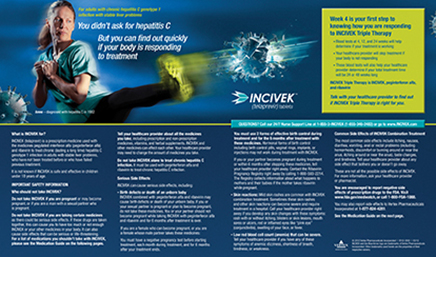Extrovertic is almost certainly not the only agency in this year’s MM&M Top 100 to have hit a few potholes in 2012, but it’s one of the few whose leaders are willing to admit it. While some other firms might try to spin sharply reduced head count as “retrenching around a core nucleus,” and dropping revenues as a sign that they “made a deliberate decision only to work with a very specific type of client,” Extrovertic founding partner and “chief extrovert” Dorothy Wetzel flatly acknowledges that 2012 was “a challenging year” for the agency.
The primary reason for this was the conclusion of Extrovertic’s relationship with Vertex, as consumer AOR for the launch of Hepatitis-C drug Incivek. The drug was sent out into the world, the relationship between agency and client ramped down and that was that. “Revenues went down a bit,” Wetzel reports. Last May, she expressed hope that Extrovertic would end 2012 in the neighborhood of $10 million in revenues; the firm closed out the year at $4 million. To service the Incivek business, Extrovertic jumped its staff from 10 full-timers in 2011 to 40 at this time last year; head count currently sits in the upper teens.
While Wetzel admits that 2012 “was a year of flux,” she also says that at least part of that flux was part of the company plan. Extrovertic, she notes, was envisioned less as a mid-sized concern than as an entity that “could be a little more scalable and virtual. You don’t need all the people when you don’t have the work for them.”
Like any number of other firms, Extrovertic has a stable of freelancers on call and uses them liberally. “That model allows you to put together the perfect team,” Wetzel says. “Clients are already comfortable with it. They see the benefit of having teams that are designed specifically for them.” She points to her past experience on the client side of the ball, at Pfizer, as partial evidence: “Most of the time, half the people in the room were freelance.”
Even as Wetzel cops to the challenges of the last year, she has plenty of good news to report. The company added Actient Pharmaceuticals to its roster (for testosterone drug Testopel) and entered the OTC arena with work on hemorrhoid-relief drug Anuleaf. Biogen Idec came on board with the agency for the first time, tapping Extrovertic to work on its MS franchise. The agency also grew its relationship with EMD Serono, adding Serostim (for HIV-associated wasting) to its roster.
But where Extrovertic truly distinguished itself was as a thought leader, one of the rare agencies that actually seems more than cursorily interested in asking and answering big-picture questions. In partnership with Regal Health, it conducted a patient empowerment study in which it sat down with activists in the MS community. “We wanted to understand more broadly what they’re about—what they know about new product launches coming up, where they get their information. They’re what patient empowerment will look like in the next few years,” Wetzel says.
What Extrovertic learned from the study came as a surprise. As opposed to the stereotype of the churlish activist, the study revealed that MS patients are positive about the current courses of treatment and about their interactions with their physicians. “They’re positive about the future, despite living with a pretty tough disease,” Wetzel notes admiringly. In addition, the activists are “quite thorough and measured” in the way they analyze and convey information. “They don’t hear one piece of information and spit it out as fact. They’re very considered and journalistic in their responses,” she adds. Look for Extrovertic to repeat the study in the months ahead with hepatitis-C activists.
From the July 01, 2013 Issue of MM+M - Medical Marketing and Media








